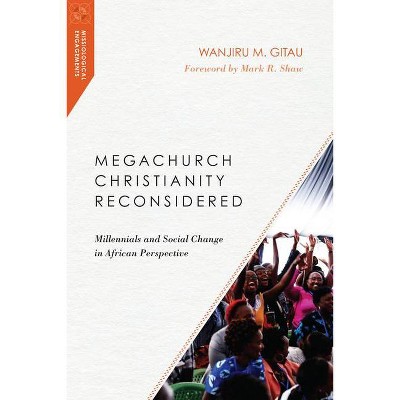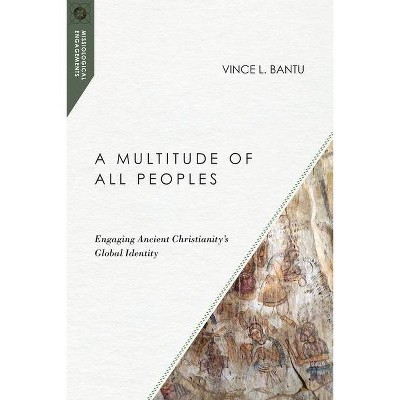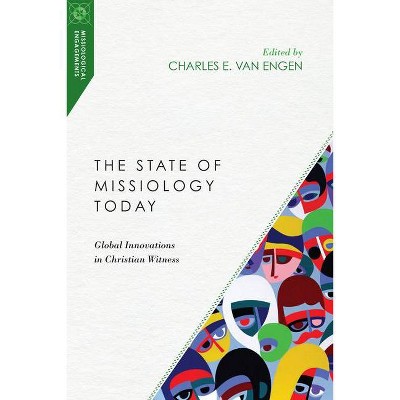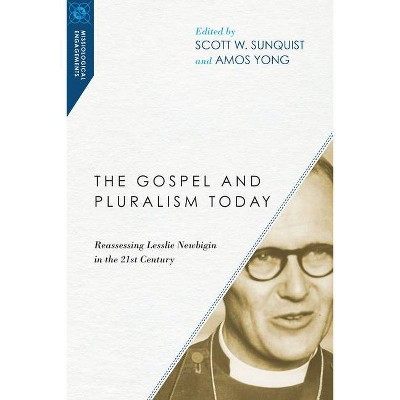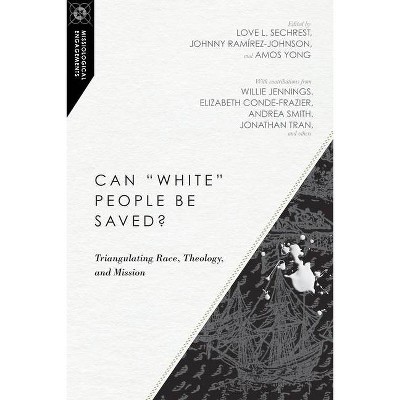Apostolicity - (Missiological Engagements) by John G Flett (Paperback)
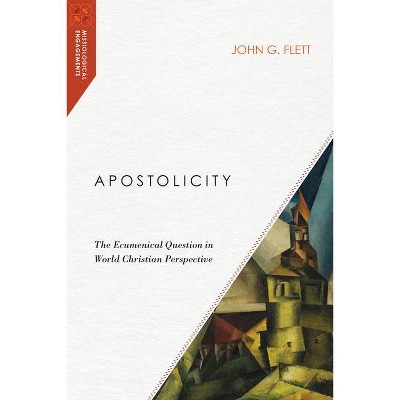
Similar Products
Products of same category from the store
AllProduct info
<p/><br></br><p><b> About the Book </b></p></br></br><p>At the heart of the ecumenical discussions over the past century lies the issue of what constitutes the apostolicity of the church. In an attempt to forge structural agreements, these discussions have ignored the diversity of world Christianity. In this groundbreaking study, John Flett presents a bold account of an apostolicity that embraces plurality.</p><p/><br></br><p><b> Book Synopsis </b></p></br></br><p>What constitutes the unity of the church over time and across cultures? Can our account of the church's apostolic faith embrace the cultural diversity of world Christianity? The ecumenical movement that began in the twentieth century posed the problem of the church's apostolicity in profound new ways. In the attempt to find unity in the midst of the Protestant-Catholic schism, participants in this movement defined the church as a distinct culture--complete with its own structures, rituals, architecture and music. Apostolicity became a matter of cultivating the church's own (Western) culture. At the same time it became disconnected from mission, and more importantly, from the diverse reality of world Christianity. In this pioneering study, John Flett assesses the state of the conversation about the apostolic nature of the church. He contends that the pursuit of ecumenical unity has come at the expense of dealing responsibly with crosscultural difference. By looking out to the church beyond the West and back to the New Testament, Flett presents a bold account of an apostolicity that embraces plurality.</p><p/><br></br><p><b> Review Quotes </b></p></br></br><br><p>Ecumenical discussions assume that the apostolic faith is transmitted through ecclesial practices and institutional structures. John Flett shows how this assumption leads, quite logically, to colonization as a mode of Christian mission. Alternatively, he argues that the experience of world Christianity should be taken as a point of departure. Diverse expressions of Christianity already share the apostolic faith; they do not need to be linked to some Western tradition to justify their apostolic continuity. This book's implications for ecclesiology and mission are huge.</p>--The Christian Century, May 10, 2017<br><br><p>Apostolicity is associated with the very foundation of the church, yet its meaning has been distorted by faulty interpretation. Rather than preserving the binary definition--cultivation of the faith, communication of the faith--for most of the past two millennia the priority has been firmly placed on cultivation, making communication subsidiary. This has had profoundly negative consequences for both church and mission. In this pioneering study Dr. John Flett shows with multiple examples--historical, theological and cultural--how pervasive and influential this traditional view has been. Today's pluriform and polycentric global Christianity will continue to move with a limp so long as a true apostolicity is not appropriated. This work boldly and constructively points the way forward.</p>--Wilbert R. Shenk, senior professor of mission history and contemporary culture, Fuller Graduate School of Intercultural Studies<br><br><p>Following John Flett's incisive critique of the missio Dei paradigm in <em>The Witness of God</em>, <em>Apostolicity</em>--a further interrogation of post-war ecumenical theology--does not disappoint. In this challenging book Flett tackles the theological significance of the diversity recognized in the study of world Christianity. This leads him to question an ecumenical understanding of apostolicity as based on historical origins and the continuity of church cultures. He does so on the grounds that it leads merely to church replication and not mission, which, following Christ in the Spirit, is anything but smooth and predictable. The book encourages serious engagement at the interface of church history, mission realities and Christian doctrine.</p>--Kirsteen Kim, professor of theology and world Christianity, Leeds Trinity University, editor of Mission Studies<br><br><p>In many respects, this work by John Flett is an outstanding contribution to international ecumenism and to the discussion on current issues in mission theology. The topic of apostolicity touches on the question of continuity, and it also touches on the question of crossing boundaries in the service of mission. As Swedish bishop and mission studies scholar Bengt Sundkler was wont to say, 'Transplantation means mutation.' John Flett outlines the different positions of various denominational traditions (Protestant, Roman Catholic, Orthodox, etc.) and he relates perspectives from the southern hemisphere to those from the northern hemisphere. In so doing, the book builds bridges and contributes toward mutual understanding. Flett's approach is as integrative as it is innovative and will certainly stimulate the ongoing discussion. This is a remarkable effort that deserves the highest praise.</p>--Henning Wrogemann, Protestant University Wuppertal/Bethel, author of Intercultural Theology<br><br><p>John Flett's <em>Apostolicity: The Ecumenical Question in World Christian Perspective</em> gives voice to the challenge of that course for me: how Western Christianity still struggles with the legitimacy of non-Western churches. . . . By allowing apostolicity to be reconceived as a process to be undergone rather than a historical-cultural substance to be replicated, Flett convincingly argues for a postcolonial way forward for ecclesiology.</p>--Myles Werntz, Books Culture, July 7, 2016<br><br><p>The missiological movement in the nineteenth century was a powerful force in the creation of the ecumenical movement in the twentieth. Today, it would seem that missiological theology gives promise of reorienting an ecumenical movement that is threatening to retreat into a form of splendid isolation, making itself unwittingly supportive of the attitudes of colonization that missiologists (through a lengthy period of self-criticism) have largely left behind them. At the heart of this book lies a searing indictment of those 'communion ecclesiologies' that, through their identification of the being of the church with practices internal to them, foster an understanding of mission in terms of the cultivation of precisely those practices in other contexts, without regard for the fact that the church itself is being treated in the process as a culture whose task then becomes the subsumption of other cultures into itself. This is a book that is bound to make some folks angry. Hopefully, it will awaken many others to the need for more culturally-sensitive accounts of Christian mission.</p>--Bruce L. McCormack, Princeton Theological Seminary<br><br><p>The nature of apostolicity has been a vexing question in ecumenical discourse with significant consequences for our understanding of the church and its unity. In this volume John Flett challenges many of the common assumptions of this conversation in order to construct a more fully christological notion of apostolicity that resists colonizing conceptions of mission and embraces the diversity and plurality of Christian witness in the world without sacrificing the unity of the church. This is a significant contribution to ecumenical and missiological literature that is sure to provoke much conversation.</p>--John R. Franke, theologian in residence, Second Presbyterian Church, Indianapolis<br><br><p>This is a highly original work in the theology of Christian mission that deserves the serious attention of missiologists, theologians and New Testament scholars. Flett has issued a weighty challenge to all attempts--from whatever ecclesiastical stable--to ground the apostolic being of the church in ecclesiological form or some static essence. The church is apostolic only to the extent that its testimony to Jesus Christ is severally received and embodied by diverse peoples and cultures. The diversity of world Christianity today is thus not a problem for the apostolicity of the church, but rather integral to its very being as the body of Christ, the one sent into the world to redeem it.</p>--Brian Stanley, professor of world Christianity, University of Edinburgh<br>
Price History
Price Archive shows prices from various stores, lets you see history and find the cheapest. There is no actual sale on the website. For all support, inquiry and suggestion messagescommunication@pricearchive.us
